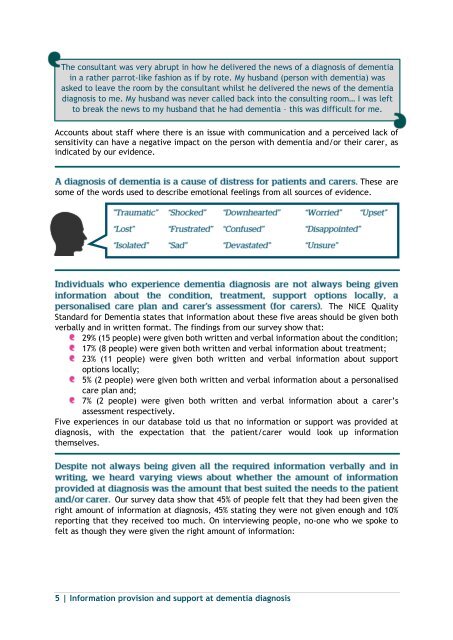1 | Information provision and support at dementia diagnosis
Insight-Report-Dementia-diagnosis
Insight-Report-Dementia-diagnosis
You also want an ePaper? Increase the reach of your titles
YUMPU automatically turns print PDFs into web optimized ePapers that Google loves.
The consultant was very abrupt in how he delivered the news of a <strong>diagnosis</strong> of <strong>dementia</strong><br />
in a r<strong>at</strong>her parrot-like fashion as if by rote. My husb<strong>and</strong> (person with <strong>dementia</strong>) was<br />
asked to leave the room by the consultant whilst he delivered the news of the <strong>dementia</strong><br />
<strong>diagnosis</strong> to me. My husb<strong>and</strong> was never called back into the consulting room… I was left<br />
to break the news to my husb<strong>and</strong> th<strong>at</strong> he had <strong>dementia</strong> – this was difficult for me.<br />
Accounts about staff where there is an issue with communic<strong>at</strong>ion <strong>and</strong> a perceived lack of<br />
sensitivity can have a neg<strong>at</strong>ive impact on the person with <strong>dementia</strong> <strong>and</strong>/or their carer, as<br />
indic<strong>at</strong>ed by our evidence.<br />
These are<br />
some of the words used to describe emotional feelings from all sources of evidence.<br />
The NICE Quality<br />
St<strong>and</strong>ard for Dementia st<strong>at</strong>es th<strong>at</strong> inform<strong>at</strong>ion about these five areas should be given both<br />
verbally <strong>and</strong> in written form<strong>at</strong>. The findings from our survey show th<strong>at</strong>:<br />
29% (15 people) were given both written <strong>and</strong> verbal inform<strong>at</strong>ion about the condition;<br />
17% (8 people) were given both written <strong>and</strong> verbal inform<strong>at</strong>ion about tre<strong>at</strong>ment;<br />
23% (11 people) were given both written <strong>and</strong> verbal inform<strong>at</strong>ion about <strong>support</strong><br />
options locally;<br />
5% (2 people) were given both written <strong>and</strong> verbal inform<strong>at</strong>ion about a personalised<br />
care plan <strong>and</strong>;<br />
7% (2 people) were given both written <strong>and</strong> verbal inform<strong>at</strong>ion about a carer’s<br />
assessment respectively.<br />
Five experiences in our d<strong>at</strong>abase told us th<strong>at</strong> no inform<strong>at</strong>ion or <strong>support</strong> was provided <strong>at</strong><br />
<strong>diagnosis</strong>, with the expect<strong>at</strong>ion th<strong>at</strong> the p<strong>at</strong>ient/carer would look up inform<strong>at</strong>ion<br />
themselves.<br />
Our survey d<strong>at</strong>a show th<strong>at</strong> 45% of people felt th<strong>at</strong> they had been given the<br />
right amount of inform<strong>at</strong>ion <strong>at</strong> <strong>diagnosis</strong>, 45% st<strong>at</strong>ing they were not given enough <strong>and</strong> 10%<br />
reporting th<strong>at</strong> they received too much. On interviewing people, no-one who we spoke to<br />
felt as though they were given the right amount of inform<strong>at</strong>ion:<br />
5 | <strong>Inform<strong>at</strong>ion</strong> <strong>provision</strong> <strong>and</strong> <strong>support</strong> <strong>at</strong> <strong>dementia</strong> <strong>diagnosis</strong>



